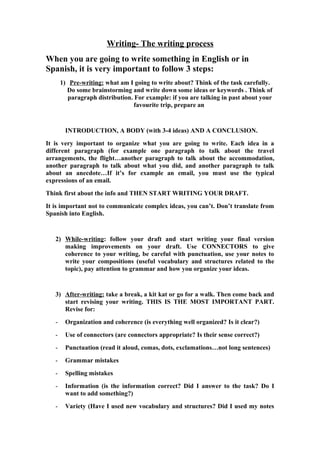
Writing
- 1. Writing- The writing process When you are going to write something in English or in Spanish, it is very important to follow 3 steps: 1) Pre-writing: what am I going to write about? Think of the task carefully. Do some brainstorming and write down some ideas or keywords . Think of paragraph distribution. For example: if you are talking in past about your favourite trip, prepare an INTRODUCTION, A BODY (with 3-4 ideas) AND A CONCLUSION. It is very important to organize what you are going to write. Each idea in a different paragraph (for example one paragraph to talk about the travel arrangements, the flight…another paragraph to talk about the accommodation, another paragraph to talk about what you did, and another paragraph to talk about an anecdote…If it’s for example an email, you must use the typical expressions of an email. Think first about the info and THEN START WRITING YOUR DRAFT. It is important not to communicate complex ideas, you can’t. Don’t translate from Spanish into English. 2) While-writing: follow your draft and start writing your final version making improvements on your draft. Use CONNECTORS to give coherence to your writing, be careful with punctuation, use your notes to write your compositions (useful vocabulary and structures related to the topic), pay attention to grammar and how you organize your ideas. 3) After-writing: take a break, a kit kat or go for a walk. Then come back and start revising your writing. THIS IS THE MOST IMPORTANT PART. Revise for: - Organization and coherence (is everything well organized? Is it clear?) - Use of connectors (are connectors appropriate? Is their sense correct?) - Punctuation (read it aloud, comas, dots, exclamations…not long sentences) - Grammar mistakes - Spelling mistakes - Information (is the information correct? Did I answer to the task? Do I want to add something?) - Variety (Have I used new vocabulary and structures? Did I used my notes
- 2. to use new things?) Revise it AGAIN and AGAIN. WRITING IS NOT SOMETHING YOU CAN DO IN A HURRY! WORK ON THIS!!!!!!!!!!!!!! AND DON’T FORGET: READING, READING, READING…THE MORE YOU READ, THE BETTER YOU’LL WRITE.